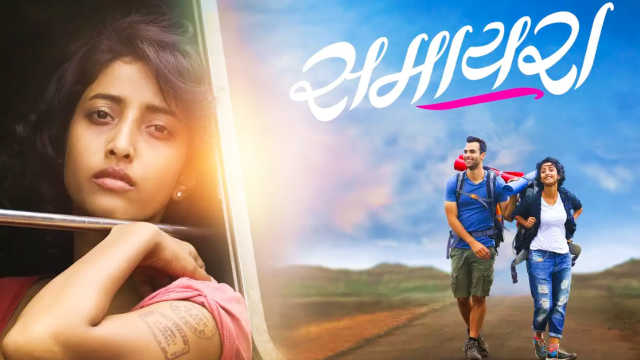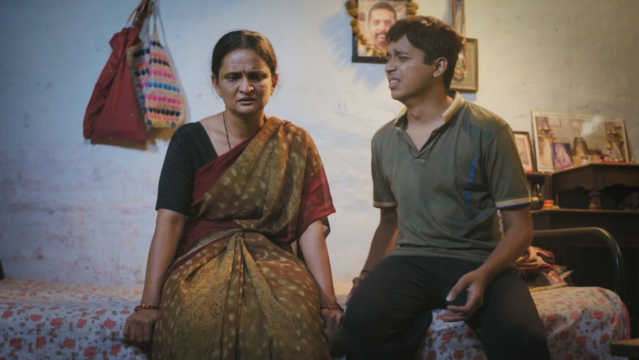
Suparna Thombare
Mumbai, 08 Feb 2019 12:55 IST
Just like the first part, the second part of the biopic on Maharashtra's much-loved writer, actor and humorist picks key moments from his life. But this time the focus is on social and political highlights.

The second part of Bhaai: Vyakti Kee Valli aptly opens with the song 'Indrayani Kathi', meaning 'on the banks of the Indrayani', written by PL Deshpande and sung by his close friend Bhimsen Joshi, alongside snapshots from the first part of the film, leading us right back into the second half of Pu La's life.
The narrative continues to unfold through flashbacks as more and more friends start visiting the ailing writer-humorist Pu La (Sagar Deshmukh) as he battles for life in a Pune hospital. The list includes actresses Bhakti Barve and Vijaya Mehta (Neena Kulkarni), and Shiv Sena chief Bal Thackeray.
Just like in the first part, director Mahesh Manjrekar and screenwriter Ganesh Matkari present us with highlights of Pu La's life, never fully exploring the psychological motivations of the man.
Once again, like in the first part, one of the major highlights is the extended singing session featuring Bhimsen Joshi (Ajay Purkar), Vasantrao Deshpande (Padmanabh Bind), Kumar Gandharva (Swanand Kirkire) and Champa Tai (Veena Jamkar). The scene depicts the bond the friends, each a renowned artiste, shared.
It is also the first time in two parts we see the laughing and wisecracking Pu La break down when one of his close friends from the group passes away.
Bhaai – Vyakti Kee Valli review: An enjoyable, candid portrait of PL Deshpande
But while the first part portrayed Pu La's personal life, this part includes the social and political incidents in his life once he became a renowned public figure.
In one scene, acclaimed writer Vijay Tendulkar is seen scoffing at the 'unrealistic' writing of Pu La Deshpande and criticizing popular theatre. Pu La admits he could never write socially relevant content like Tendulkar and praises him for his work in the same vein as he praised the work with mass appeal.
It is a very important scene that places Pu La amidst his contemporaries and gives a passing mention to criticism that came his way from intellectuals.
Pu La is painted as the man who wrote to entertain and lived to make others smile. His donations towards medical advancements and annual work with Baba Amte (Sanjay Khapre) in service of leprosy patients further enhance the image. Watch out for an emotional performance of the funny man alongside kids cast out by society because of their disease.
Writer Ganesh Matkari also places Pu La in the political mileu of the time in the latter part of the film.
While Pu La was totally apolitical in his writing, he did give a charged speech during the post-Emergency period. He criticized the Congress for curbing freedom of expression during the Emergency, but he turned down the Janata Party's offer to join it. The depiction of this incident offers a political perspective of the man and his relevance.
"I am a jester," he says, turning down the Janata Party's offer. "When a politcial party thwarts freedom of expression, we take off the mask. If your party does the same thing, we jesters will once again take our masks off and speak."
Ganesh's father Ratnakar Matkari's dialogue writing here is visibly more effective than in the first part.
Deshpande publicly calling his one-time student Bal Thackeray's political strategy "dictatorship" on stage and calling him a "brat" in a personal conversation with his wife are crucial aspects of who he was as a man.
In the opening of the film, when well-wishers ask Pu La's wife Sunita Bai (Shubhangi Damle) to go home and rest, she says that if by any kind of scientific miracle, Bhaai (as PL was lovingly called by her and by associates) woke up, he would be worried if she weren't by his side. This first scene is the essence of the film.
Sunita Bai's constant support for her husband and their intellectual compatibility come through beautifully in Matkari's writing, adding a lot more depth and gravitas to the film that otherwise just cherry-picks the best moments of Bhaai's life.
While Manjrekar takes us through Deshpande's social work with Baba Amte, his work at Doordarshan, his political ideologies and his transition to one-man shows, the core of the narrative is the love and solid companionship that Pu La shared with his wife.
It is the emotion and vulnerability of their personal moments that hold the narrative. And while the other performances remain ordinary, Deshmukh and Iravati Harshe (playing the younger Sunita) add more dimensions and depth to their parts as the film goes along.
Manjrekar presents Pu La with the many facets that he had — professor, harmonium player, composer, writer, performer and social activist. But he places Pu La the husband through Sunita Bai's eyes with the most effect.
Manjrekar's biopic lacks in depth, yet brings to the screen the best of Pu La, depicting him as a cultural icon of Maharashtra — a vyakti (person) and a valli (character).
You might also like

Review Marathi
Samaira review: This well-intentioned travel drama suffers from a dull script
Actor Rishi Deshpande's directorial debut doesn't rise as much as its performances. ...

Review Marathi
Goshta Arjunchi review: Triggering conversations about mental health
Anupam Barve’s short film urges people to talk to their families about what they are going...

Review Marathi
Ekda Kaay Zala review: Sumeet Raghvan impresses in a film that does not use its full potential
Directed by Dr Saleel Kulkarni, the film has a fine act by child artiste Arjun Purnapatre....

